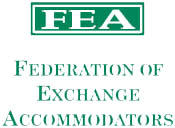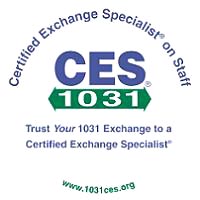Frequently Asked Questions
Why is a Qualified Intermediary needed?
Since the exchange ends the moment the investor or business owner has taken actual or constructive receipt of the proceeds from the sale of the relinquished property, using a Qualified Intermediary is a way to safeguard against this happening. The Qualified Intermediary holds the proceeds from the sale in a secure escrow account until they are needed to acquire the replacement property. If the investor or business owner takes receipt of the funds, it is considered a taxable event.
What if the investor or business owner can't identify any replacement properties within the 45 days, or close on any replacement properties before the end of the exchange period?
Unfortunately, there are no extensions available, except in rare cases. If the investor or business owner does not meet the time limits, the exchange will fail and the investor or business owner will have to pay any taxes that arise on the gain from the sale of the relinquished property. For more information on your specific situation, please contact 1031 Accommodators®, LLC.
Can someone take cash out of a 1031 exchange?
Cash cannot be taken out of an exchange without creating a taxable event. If the investor or business owner elects to take cash out of the sale proceeds, this is called "boot" and is taxable. In order to avoid taxable boot, the investor or business owner can opt to refinance after the exchange transaction is completed.
When is the best time to notify the related parties about the intent to complete a 1031 exchange?
The investor or business owner should wait until all terms of the agreement of sale have been agreed upon before informing the related parties about the intent to complete a 1031 exchange. One would like the cooperation of the other parties, but it is not required as long as they have been notified in writing. 1031 Accommodators®, LLC can also help to notify the related parties.
Can someone close on the replacement property before they have a buyer for the relinquished property?
Yes. This type of exchange is known as a reverse exchange. To make this exchange work, someone other than the investor or business owner (usually the Qualified Intermediary) must take title to the property until the exchanger is ready to sell the relinquished property to a buyer. For more information on reverse exchanges, please contact 1031 Accommodators®, LLC.
Can someone make improvements to the replacement property in order to reinvest all the sale proceeds?
Yes. This type of exchange is known as a construction or improvement exchange. To make this exchange work, someone other than the investor or business owner (usually the Qualified Intermediary) must take title to the replacement property, make the improvements that were identified within the 45-day period, and convey the title to the exchanger within the 180-day period. Without planning ahead, this is a very difficult exchange to complete within the time frame. For more information, please contact 1031 Accommodators®, LLC.
Can someone eventually use the replacement property as a primary residence or vacation home?
Yes, but they must meet the holding requirements prior to converting the property into a primary residence or a vacation home. Based on proposed regulations and case law, the minimum holding period is one year. However, most tax professionals feel that if the property shows up as a rental or for business use on two or more consecutive tax returns, the investor or business owner has shown intent to use the replacement property for rental or business use. For more information, please contact 1031 Accommodators®, LLC. Also, see Exit Strategies and Tax Planning of Mixed and "Dual" Use Properties.
(Please Note: This file requires Adobe Reader. For a free download, go to www.adobe.com)
How should a 1031 exchange be reported to the IRS?
A 1031 exchange is reported on the IRS form 1099S, which should indicate that the investor or business owner is completing a 1031 exchange*. Then, form 8824 must be completed as part of the annual federal income tax return.
*This is usually done by the closing agent.
Is it too late to initiate a 1031 exchange if the agreement of sale was already signed?
No, as long as the closing on the property has not occurred. However, once the closing occurs, it is too late to take advantage of a 1031 exchange. If necessary, 1031 Accommodators®, LLC can prepare the appropriate documents for a 1031 exchange on the same day as the closing, although 1 week prior to closing is preferred.
How much does someone have to spend in order to defer all of the capital gains?
The replacement property one wishes to acquire must have a value equal to, or greater than, the relinquished property(s). Then all proceeds from the sale must be reinvested into the replacement property(s).
For Example: An investor sells a piece of property for $1 million. Out of that, $500,000 went to pay off a mortgage and the other $500,000 went to a Qualified Intermediary to be put towards a new property. In order to defer all capital gains, the investor must purchase replacement property(s) with a total value of $1 million or more. If the investor decides to purchase a property worth $500,000, then he or she will be taxed on the other $500,000, since paying off a mortgage is considered to be the same as receiving cash from the sale of the property.
For further reading:
- 1031 Exchange Basics
- Steps to a 1031 Exchange
- Exit Strategies and Tax Planning of Mixed and "Dual" Use Properties.
(Please Note: This file requires Adobe Reader. For a free download, go to www.adobe.com)





